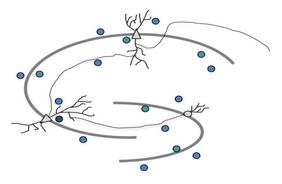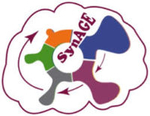Aging Synapses
There is an urgent need for a better understanding of cognitive decline in order to develop strategies for maintaining and improving mental health and quality of life in the elderly population. The research program of SynAGE proposes that cognitive decline in normal aging results from subtle synaptic alterations that imparts an imbalance between stability and plastic properties of spine synapses and that is qualitatively different from neurodegeneration.
In project 2 of this program we investigate the role of autophagy in the maintenance of synaptic protein composition and synaptic function. We are particularly interested in the intracellular signalling pathways that control the initiation of autophagy at synaptic and non-synaptic sites of neurons.

This figure illustrates the process of autophagy and its activation in neurons
In project 10 of the program we focus on age-related changes in hippocampal network activity patterns and cellular correlates of memory formation (such as synaptic long term potentiation), and how enhancing functionality of local GABAergic interneurons might alleviate these changes. Furthermore, we investigate alterations of long-range projections from the medial septum to the hippocampus. This long-range projection provides glutamatergic, cholinergic and GABAergic transmission to the hippocampus, important for initiation and maintenance of hippocampal network activity.

Sketch of the trisynaptic circuitry connecting principle cells in the hippocampus.
Blue circles indicate local GABAergic interneurons
Funding
DFG Research Training Group 2413 SynAGE, project 2 
DFG Research Training Group 2413 SynAGE, project 10
PI: Prof. Dr. Oliver Stork
Graduate Students: Dr. Katharina Klinger, Dr. Miguel del Angel
Associated researchers: Dr. Gürsel Caliskan, Dr. Yunus Emre Demiray
Collaborative Research Center 1436, project Z01: Funktional neural circuit analysis and small animal imaging in vivo 
PIs: Prof. Dr. Oliver Stork, Dr. Michael Kreutz, Prof. Dr. Frank Angenstein
